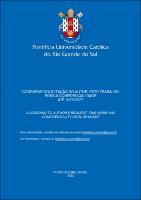| Share record |


|
Please use this identifier to cite or link to this item:
https://tede2.pucrs.br/tede2/handle/tede/10474Full metadata record
| DC Field | Value | Language |
|---|---|---|
| dc.creator | Dorfmann, Thaís Oliveira | - |
| dc.creator.Lattes | http://lattes.cnpq.br/4632192164043922 | por |
| dc.contributor.advisor1 | Stürmer, Gilberto | - |
| dc.contributor.advisor1Lattes | http://lattes.cnpq.br/2198202518344562 | por |
| dc.date.accessioned | 2022-09-16T16:47:42Z | - |
| dc.date.issued | 2022-04-27 | - |
| dc.identifier.uri | https://tede2.pucrs.br/tede2/handle/tede/10474 | - |
| dc.description.resumo | A presente dissertação analisa o princípio da prevalência do negociado sobre o legislado e os limites da autonomia coletiva à luz da Lei no 13467/2017. Apresenta inicialmente a Organização Sindical Brasileira e os conflitos coletivos de trabalho, a partir da historicidade do sistema sindical a partir de seu surgimento na Revolução Industrial durante confronto entre classes e o assento do tema na Constituição Federal de 1988. O segundo capítulo aborda a visão histórica do Direito do Trabalho e a autonomia coletiva, que é caraterística pluralista do Direito do Trabalho como resultado da emergência do Direito Social. Verifica o artigo 611-B como proibitivo de negociação em respeito ao princípio da reserva legal e outras normas constitucionais não contempladas pelo artigo 7º da Constituição Federal, e a lacuna criada pelo legislador no caput do artigo 611-A, ampliando a flexibilidade da norma. Estuda os casos em que o legislador não respeitou o princípio da reserva legal, criando divergências e contradições, principalmente no que diz respeito a insalubridade e participação nos lucros e resultados da empresa. Por fim, conclui que a flexibilização criada pelo princípio da prevalência do negociado sobre o legislado não é absoluta, destacando a necessidade do intérprete em se socorrer do conteúdo axiológico do Direito do Trabalho, da Teoria do Diálogo das Fontes e limitadores externos a lei para disciplinar o teor do instrumento coletivo nos casos não contemplados pelo artigo 611-A da CLT. | por |
| dc.description.abstract | This research analyzes the principle of negotiate over the Law and the limits of collective autonomy under the 13.467/2017 Law. At first, it presents the Brazilian Trade Union Organization and collective labor conflicts, based on the historicity of the trade union system since the emergence in the Industrial Revolution during the conflict between groups until it’s regulation in the Federal Constitution of 1988. The second chapter focuses on the historicity of Labor Law and collective autonomy, as well as the social struggles of the 19th century, where the main idea was only the economic relation. It verifies article 611-B as prohibiting negotiation in respect of the principle of legal reserve and other constitutional norms not contemplated by article 7 of the Federal Constitution, and the gap created by the legislator in the caput of article 611-A, increasing the flexibility of the norm. It studies the cases in which the legislator did not respect the principle of legal reserve, creating divergences and contradictions, about unhealthy conditions and participation in the company's profits and results. Finally, it concludes that the flexibility created by the principle of negotiate over the Law is not complete because of the necessary interpretation of the collective instruments together with the Theory of Dialogue of Sources, and external limitations that regulate the content of the collective instrument on those cases that aren’t protected by article 611-A of the CLT. | eng |
| dc.description.provenance | Submitted by PPG Direito ([email protected]) on 2022-09-06T15:20:06Z No. of bitstreams: 1 THAÍS_OLIVEIRA_DORFMANN_DES.pdf: 964192 bytes, checksum: a456c016a97b13f0a2426a3f839e4fcb (MD5) | eng |
| dc.description.provenance | Approved for entry into archive by Caroline Xavier ([email protected]) on 2022-09-16T16:42:01Z (GMT) No. of bitstreams: 1 THAÍS_OLIVEIRA_DORFMANN_DES.pdf: 964192 bytes, checksum: a456c016a97b13f0a2426a3f839e4fcb (MD5) | eng |
| dc.description.provenance | Made available in DSpace on 2022-09-16T16:47:42Z (GMT). No. of bitstreams: 1 THAÍS_OLIVEIRA_DORFMANN_DES.pdf: 964192 bytes, checksum: a456c016a97b13f0a2426a3f839e4fcb (MD5) Previous issue date: 2022-04-27 | eng |
| dc.format | application/pdf | * |
| dc.thumbnail.url | https://tede2.pucrs.br/tede2/retrieve/185489/DIS_THAIS_OLIVEIRA_DORFMANN_CONFIDENCIAL.pdf.jpg | * |
| dc.language | por | por |
| dc.publisher | Pontifícia Universidade Católica do Rio Grande do Sul | por |
| dc.publisher.department | Escola de Direito | por |
| dc.publisher.country | Brasil | por |
| dc.publisher.initials | PUCRS | por |
| dc.publisher.program | Programa de Pós-Graduação em Direito | por |
| dc.rights | Acesso Aberto | por |
| dc.subject | Sindicato | por |
| dc.subject | Autonomia | por |
| dc.subject | Princípios | por |
| dc.subject | Negociado sobre o Legislado | por |
| dc.subject | Flexibilização | por |
| dc.subject | Collective | eng |
| dc.subject | Autonomy | eng |
| dc.subject | Principles | eng |
| dc.subject | Negotiate over the Law | eng |
| dc.subject | Flexibilization | eng |
| dc.subject.cnpq | CIENCIAS SOCIAIS APLICADAS::DIREITO | por |
| dc.title | A prevalência do negociado sobre o legislado e os limites da autonomia coletiva | por |
| dc.type | Dissertação | por |
| dc.restricao.situacao | Trabalho será publicado como artigo ou livro | por |
| dc.restricao.prazo | 60 meses | por |
| dc.restricao.dataliberacao | 16/09/2027 | por |
| Appears in Collections: | Programa de Pós-Graduação em Direito | |
Files in This Item:
| File | Description | Size | Format | |
|---|---|---|---|---|
| DIS_THAIS_OLIVEIRA_DORFMANN_CONFIDENCIAL.pdf | THAIS_OLIVEIRA_DORFMANN_DIS | 393.54 kB | Adobe PDF |  Download/Open Preview |
Items in DSpace are protected by copyright, with all rights reserved, unless otherwise indicated.




